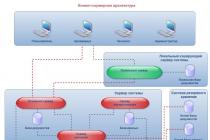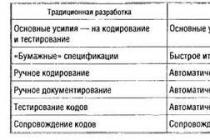The effectiveness of SD is the ratio of a new resource or an increase in an old resource as a result of the process of preparing or implementing a management decision in an organization to the costs of this process. Resources can be a new division of the company, finances, materials, personnel health, labor organization, etc. Costs can be old divisions, personnel, finances, etc. The basis of each type of efficiency is the degree of satisfaction of the needs and interests of a person, team and company in in general. Organizational effectiveness of SD is the result of achieving organizational goals with less effort, fewer people, or less time. result organizational effectiveness there may be a new department, an incentive system, etc. Economic efficiency SD is the ratio of the cost of the surplus product obtained through the implementation to a specific SD and the costs of its preparation and implementation. Social efficiency SD is seen as the result of achieving social goals for more employees and the company in a shorter time, with fewer employees, and with lower financial costs. The technological efficiency of SD is the result of achieving the industry, national or world technological level of production, planned in the business plan, in a shorter time or at lower financial costs. The result of technological efficiency can be modern methods of creative work, competitiveness of products, professionalism of the staff. The psychological effectiveness of SD is the result of achieving psychological goals for more workers or the population in a shorter time, fewer workers or less psychological costs. The results of this effectiveness can be manifested in corporate culture company, mutual aid, patriotism and loyalty. The legal effectiveness of SD is assessed by the degree to which the legal goals of the organization and personnel are achieved in a shorter time, with fewer employees or less financial costs. The environmental performance of SD is the result of achieving the environmental goals of the organization and staff in a shorter time, with fewer employees or at lower financial costs.
The effectiveness of SD is divided by the levels of its development and implementation, the coverage of people and companies. They single out the effectiveness of SD at the level of production and management of a company, a group of companies, an industry, a region, a country. SD efficiency management is carried out through a system of quantitative and qualitative assessments based on real indicators, norms and standards.
Control is a management function that establishes the degree of compliance of the decisions made with the actual state of the system, identifying deviations and their causes. The need for control is obvious, practice shows that even well-developed solutions are not implemented due to the lack of a well-functioning control system. The process of control is the activity of the subjects of control, aimed at the implementation of the decisions made by implementing certain tasks, methods. It is characterized by three components: content, i.e. what is carried out in the control process, organizational, i.e. by whom and in what sequence control is carried out, technological, i.e. how control is exercised. The purpose of control is to ensure the unity of decision and execution, to prevent errors and shortcomings, deviations. The content of control is manifested in the functions it performs. The diagnostic function of control is to identify the actual state of the implementation of the decision. The orienting control function is aimed at indicating landmarks, i.e. those questions that this moment deserve attention. The stimulating function is manifested in the identification and involvement "in the work" of all unused resources, primarily the human factor. The corrective function of control is to clarify the essence of the decision itself in the event that the situation has changed. And finally, one of the functions of control is architectural supervision, which allows you to check the implementation of the idea. Proactive control is developed on the basis of norms, standards, rules in the process of developing a solution. The scheme for organizing proactive control is as follows:
Requirements for effective control: - Strategic focus (should reflect the overall priorities of the organization and support them); - Oriented to results ( Final goal control is not to collect information, set standards and identify problems, but to solve the problems facing the organization); - Timeliness
Preliminary control is carried out before the implementation of the decision. His the main task- to establish whether the goals are correctly defined and the strategy is chosen. At this stage, criteria for evaluating the solution are developed and adjusted, and the methodology for the next type of control - the current one - is being debugged. Current control is carried out in the process of developing and implementing the solution. It includes the necessary measurements, weighing, evaluation. In a one-time order, a filtering type of current control is used when, due to sharp deviations, the implementation of the solution is suspended. The process of current control to increase its flexibility, accuracy and objectivity must be carried out with the involvement of a PC. The final control has three important features: a) creation or replenishment of a database of implemented solutions on a PC; b) formation of statistics of the organization's activities for decision-making in expert situations; c) identification of innovative proven technologies. The development of theory and practice has led to the emergence of a new direction in management - controlling, the object of which is also management decisions.
Responsibility is the need to give someone an account of their actions, deeds and compensate for non-performance or improper performance of the assigned action. Responsibility can be official and personal, compulsory and voluntary. The latter is interpreted as a trait of a person's character - a sense of responsibility. Official types of responsibility are divided into two groups: technological and humanitarian. Technological types of responsibility include: professional, disciplinary, administrative, legal, economic and material, humanitarian - social, ethical, environmental and political. All these types of responsibility can be classified according to: levels of responsibility (international, state, the level of the company and its divisions and the level of one's own self); time of responsibility (for past, present or future results of a decision already made); damage caused by erroneous decisions (liability for significant damage that does not have a statute of limitations, damage for which liability has a statute of limitations usually 3 or 5 years).
Professional responsibility is reflected in job descriptions. The disciplinary responsibility of the head is reflected in the internal regulations of the company (instructions, regulations, etc.) and relates to the organizational aspects of the head's activities. Administrative responsibility comes for civil procedural violation of the rights and freedoms of citizens. Legal liability partially or fully relates to those types of liability that are regulated by the Civil and Criminal Codes. Economic liability is usually viewed in relation to legal entity(of the company) for non-fulfillment or improper fulfillment of the obligations assumed.
management elite. How we select and prepare Tarasov Vladimir Konstantinovich
2.6 Consequence analysis management decisions
The participants of the first competition were offered certain management decisions, they were also required to evaluate these decisions in terms of their possible consequences: both positive and negative, both close and distant in time.
In particular, such a task was proposed.
A decision was made to allow subordinates to reduce the amount of bonuses to their heads of departments if, in the opinion of subordinates, the heads of departments did not perform their duties well enough.
Just as every leader has a more or less conscious idea of ideal organization, so each participant has some idea of \u200b\u200bthe ideal leader. This performance largely determines his behavior in the competition. In addition, imagining how the image of the ideal leader is drawn by the members of the jury, many of the participants voluntarily or involuntarily try to adapt to it.
The ideal leader of the era of the late 70s - early 80s. (the era of the “heyday of stagnation”) seems to be a kind of two-faced Janus: the face turned to the authorities was a clear, smart, ready to carry out any order of the officer; looked at his subordinates a little tired, weighed down important things a strict but caring father.
The desire to enter the image of an "officer" had a strong effect on the performance of this task. The participant came out and clearly “reported”: “I don’t see any negative consequences either in the near or in the distant future!”
If a person is able to see only one side of the coin, this means that he is not able to adequately assess the consequences of managerial decisions. Unless, of course, this is an attempt to please the members of the jury, to adjust to their supposed expectations.
The art of managing involves the ability to turn “minus” into “plus” for oneself (and “plus” into “minus” for the enemy). Although we did not conduct special studies on this subject, I personally got the feeling that the result of completing this, in general, simple task correlates well with the outcome of the competition as a whole: as a rule,
the winner is the one who is able to comprehensively assess the consequences of their decisions.
However, there were consequences of managerial decisions that were almost always overlooked by the competitors. This is the growth or decline of the authority of the enterprise in the city, region (i.e., the image, prestige of the company). Obviously, the orientation of middle managers to the prestige of the organization in those days was absent or was relegated to the background.
As in life typical mistake was gross violation problem solving sequences: they start with an assessment of the solution - is it good or bad. Let's say it's bad. Then this estimate is taken as the basis on which all further analysis is adjusted. And what is required is just the opposite: to evaluate all possible consequences, and not decisions as a whole.
And in general: there can be no “correct” solution to a managerial situation set out on paper in a few lines. There can only be a scenario for solving it, containing or not containing errors that we, at our level of knowledge, could point out.
Imagine that you were asked to familiarize yourself with the results of the calculations of the "date of birth of the last inhabitant of the Earth." It is difficult for you to judge this problem, but if, after looking into these calculations, you find several arithmetic and logical errors, you will have no doubt that the final result is, in any case, incorrect.
When a participant is looking for a way out of a situation, it is not the result that is important, but the scenario, the path along which he goes, the mistakes that he makes while doing so. In the analysis of consequences, we deal with turnkey solution and we cannot trace the course of reasoning preceding it. Max Weber once pointed out that
Disputes about means often hide disagreements about goals.
Dealing with social problems, it is impossible, as in mathematics, physics or chemistry, following different paths, inevitably to come to the same result. Therefore, without knowing the way in which this managerial decision was obtained (what circumstances and considerations were taken into account), we cannot fully understand it, we cannot reject or support it “out of the blue”.
The decision proposed above, the consequences of which had to be assessed, refers precisely to those that are willingly rejected “out of hand”: how is it possible for subordinates to determine the size of the bosses’ bonuses?! The boss will then cease to be the boss, just as official it is difficult to fully fulfill one's duty after accepting a bribe. (To be fair, it should be noted that in recent years bribes have been taken more often behind performance of duty.)
Let's try to identify the positive consequences this decision. The head of the department, on whom the establishment did not depend given order, may begin to act with an eye on the opinions of subordinates, adapt to them, or may not adapt, stick to their line, in a word, stick with dignity. Isn't the identification of the leader's merits a positive consequence of this decision?! And the subordinates themselves, having received this lever of influence on their leader, will they not show their merits by using this lever?!
And if this decision is bad, doesn't it integrate the team on the basis of understanding that it is bad?! And if it does not integrate, then, perhaps, it differentiates on the basis of a different attitude to this decision. Vladimir Lenin, a well-known political figure and social technologist in the past, owns an aphorism:
before uniting, it is necessary to disengage.
As you can see, there can be quite a lot of positive consequences. Their discovery takes time, but that's all. Experience suggests that as soon as a leader who has not previously seen any positive consequences of a given decision finds out that the authorities authoritative for him support this particular decision, the range of vision of the consequences for him immediately expands.
The same can be said about the negative consequences.
A leader who is carried away by the decision made, not inclined to analyze all the consequences, sincerely believing that “in this case there are simply no negative consequences!”, can become a dangerous person for society, who sees the enemy in anyone who expects any negative consequences of this wonderful decision.
In nature, there is no managerial decision that would have only positive or only negative consequences, no matter from whose position we consider these consequences.
This text is an introductory piece. From book Crisis management: lecture notes author Babushkina Elena6. Technology for developing managerial decisions in anti-crisis management The most important stage in bringing an organization out of a crisis situation is the development of managerial decisions. The quality of management decisions depends on many factors, most
From the book Management: lecture notes author Dorofeeva L ILECTURE No. 5. Management decision making 1. The concept of a management decision and its places in the management process A management decision is a product of management work, and its adoption is a process leading to the emergence of this product. Decision making is
From the book Management Decisions author Lapygin Yuri Nikolaevich2. Classification of management decisions a large number of a wide variety of solutions. They differ in content, duration and development, focus and scale of impact, level of acceptance, information security, etc.
From the book Management: a training course author Makhovikova Galina Afanasievna1.3. Levels of managerial decision-making Decision-making is a management mechanism that provides a choice of ways to achieve its goals. Goals are short-term (their achievement is ensured by the adoption of operational decisions), medium-term (as a rule, guaranteed
From the book Effective Churchill author Medvedev Dmitry Lvovich1.5. Classification of management decisions Classification of decisions is necessary in the following situations.1. To determine methods for solving various problems that arise in management practice. The choice of one tool or another is based on the regularities
From the book Time Management in a nutshell author Gorbachev Alexander Gennadievich3.3. The task of making managerial decisions
From the book Fundamentals of Management author Mescon Michael4.2. Paradigms for the development of management decisions A paradigm is a historically established standard form approach to a problem situation, based on a set of concepts and principles. A concept is understood as a system of views, a pivotal, established
From the author's bookSection II Instruments for taking managerial
From the author's bookTopic 3. ESSENCE AND CONTENT OF MANAGEMENT DECISIONS Content of the topic Economic, organizational, legal, technological, multi-stage essence of management decisions from the standpoint of the "black box" model. The process of developing and implementing management
From the author's book5.1. The essence of managerial decisions Any decision is always a choice that a person makes consciously. The leader also chooses one of options actions to achieve the goal, but the managerial decision is fundamentally different from the choice
From the author's book5.2. Types of management decisions Management decisions, being similar in the main, are extremely diverse, characterized by significant differences that leave their mark on the process of their preparation, adoption and implementation. That is why it seems very
From the author's book5.4. Management decision-making methodology Management efficiency depends on the complex application of many factors, and last but not least, on the decision-making procedure and their practical implementation. For a management decision to be
From the author's bookPart III Management Decision Making Process of Management Decision Making Struggle for Information Information management Making managerial decisions in a turbulent environmentThe cornerstone of management is the process of making managerial decisions.
From the author's bookChapter 13
From the author's bookChapter 4 Management Decision Making There are many temptations in life. What exactly to choose? How not to make a mistake? If I had known the buyback, I would have lived in Sochi! One of the most difficult management tasks is prioritization. The difficulty lies in the fact that the situation is rapidly changing and
Severus tensed and closed his eyes for a second. It was enough for Granger to remember that in the summer when they lived together, Snape always did that when he was sick. Hermione squeezed her eyes shut tightly without letting go of his hand and touched herself in her hospital bed. Everything around suddenly disappeared. The girl was carried somewhere along a dark tunnel. Around a thousand voices, merging into an indistinguishable rumble. I wanted to close my ears and scream, but it was impossible to move or make a single sound. The only thing that kept me from getting lost in this crazy carousel was the hand of the potion master, still tightly squeezing the girl's hand. He was there and felt, too, that she. After a couple of seconds, which seemed to both of them longer than eternity, the guys simultaneously came to their senses.
Hermione! Severus! Miss Granger! Mr Evans! - joyfully excited voices were heard from all sides.
The potion master was only enough to send a faint smile to his wide brown eyes, in which a whole range of emotions was read. Then Snape fell into darkness.
Harry, you need to rest! - once again said Granger, trying to drive the restless Gryffindor.
She's been in the hospital wing for a week now, a week to be exact, since she woke up. Severus sleeps on the bed next to him, not waking up. And Harry spends all his free time here. As soon as the bell rings, announcing the end of classes, the guy rushes to the hospital wing. Caring elves, knowing that the Gryffindor does not attend breakfast, lunch or dinner, bring him food here. Under the reproachful gaze of his girlfriend, sitting on a free bunk, Potter does his homework, while chewing something and sharing the news. Ten minutes before lights out, he leaves for the Gryffindor tower, and early in the morning, barely putting himself in order, again rushes to Madam Pomfrey's abode. The nurse shakes her head disapprovingly, but, knowing full well that this restless boy cannot be driven away, she is silent, like McGonagall.
I'm not tired, Germ! Harry looked up from his Transfiguration textbook for a second to give his friend a smile and a sad look at Snape's bed.
Let me at least help, - Granger sighed doomedly, trying not to turn in Severus's direction, so as not to betray her anxiety. Potter doesn't need to know. Enough of the fact that she peered all night with bated breath at such beloved and such frighteningly pale features of the potions master
Yes, I almost ... it just doesn't fit here ... - the Gryffindor ran his hand through his hair and, wrinkling his face funny, showed the right place on the long scroll.
Fascinated by the problem, the guys did not notice Davis entering the ward, and for a couple of minutes, with a sad smile, he watched the two heads bend over the parchment before whispering:
What are we doing?
The Gryffindors, predictably, jumped up on the bed.
Marty, you scared us so much! Hermione whispered back, moving over to have the professor sit next to him. - That's what we're trying to do. homework. Well, you did back!
And what do you want? Last year, - Davis shrugged his shoulders and, quickly looking around, like a schoolboy who had planned some dirty trick, said: - Well, what do you have there?
Harry and Hermione looked at each other, smiling.
Can you go for a walk? asked Madam Pomfrey, who appeared in the ward a minute after Harry finished his Potions essay. "Miss Granger would benefit from fresh air, and you too, Mr. Potter."
I'll sit here a little while, and you go.
It was already quite cool, so there were almost no students near the lake. Sitting down on a bench and tucking a yellow oak leaf under the toe of her boot, Granger finally decided to ask the questions that had tormented her all the time:
Marty, what happened then... and what about... the Weasleys? - Catching Davis's surprised, confused look, the Gryffindor explained: - I didn't want to ask Harry.
We don't know much... When you were distracted by Ginny, Zabini came to his senses... He, as it turned out, wielded wandless magic... There's some kind of ancient ancestral curse... In general, you were supposed to forever fall into to someone or something like that... At the same time, Zabini gave you and Malfoy a hard time... When we got to the manor, almost all the Slytherins came to their senses and wanted to run away, but it didn't work out. By the way, Evans is a great battle mage, he almost tore them on the spot when he saw you. They were immediately taken to Azkaban. A couple of days later they were found dead in their cells. The official version - could not stand the next failure and committed suicide.
You and Malfoy were taken to Hogwarts. Draco quickly came to his senses, but you... They called a council, the best healers came... Here your Severus helped again - in all of England there are only three people who know how to brew Life of Death. And he did, but it's not so much the potion that matters as the binder - the person you would come back for. You only missed Harry and Evans.
What about Ginny and Ron? Granger whispered, trying to digest the information.
The Weasleys went to Romania to live with Charlie. There is a small school not far from Bucharest... they will finish their education there... They also got it then, on the estate... They spent two weeks in Mungo...
Did they really want to get rid of us? Hermione asked, not noticing the tears rolling down her cheeks.
Ginny and Knott actually dated last year. I don't know if they loved each other or if it was just... mutually beneficial cooperation... - carefully choosing his words, Davis replied. He really didn't want to say all this, but someone had to. - Before the battle, they, it seems, broke up. At parting, Nott gave Ginny a pendant - a rare artifact: if a person at least once took offense at someone, even because of a trifle, you just need to correctly remind him of this and the insult develops almost into a blood feud. The one who wears the pendant is ready to do anything to get rid of the object of hatred. An amazing gift of persuasion immediately wakes up, and this person can win over almost anyone to his side ... Nott, most likely, wanted to help Voldemort get Harry in this way, but nothing came of it - Weasley hid the gift, never wearing it. It was not possible to establish Knott's connections with the Death Eaters - he did not have a mark, most likely, for the sake of obtaining it, he tried, but to no avail. In the fall, he and Ginny again began to communicate in secret from everyone. He managed to convince her of his love. Harry moved away from her ... Weasley only wanted to make him jealous. She put on a pendant ... That's when Nott played on Ginny's resentment towards Harry and you. She convinced her brother, and they set up a trap for you - some kind of portkey system, a new development: you just need to put some object in your pocket or attach one or another person or several people to the clothes, and then activate your portkey and you will all be transferred to Right place. At first, something went wrong - Harry became ill, Evans picked him up and carried you five. Weasley was immediately transported to one of the rooms of the estate. The plan was simple and seemingly win-win. It was possible to take revenge on everyone at once: the traitor Malfoy, the hero Potter and his girlfriend Granger. But Nott did not take into account one thing - Weasley had already communicated with a black artifact - Riddle's diary. You can't say that she has developed immunity - this is almost impossible - just last time she managed, albeit not quite, to get rid of the diary. She did not want to obey, realizing that something was wrong. And this time common sense managed to defeat the magic for a while, but it was too late ... She tried to cancel everything, but Nott was not going to retreat. A new portion of beliefs - and Ginny is again the way he needs.
When Weasley woke up in the hospital, she herself immediately told everything. Harry did not want to believe for a long time, but he had to when he saw her memories. As soon as they were discharged, Ginny insisted on moving. They told Mr. and Mrs. Weasley that they just wanted a change of scenery. We did not expand on anything - Harry asked. For all of you, you were just captured by the Slytherins, trying to avenge their master's death.
Ginny wanted to apologize to you in person, but she knew you might not want to see her, not without reason, so she asked me to write to her when you recovered. This is the letter that arrived this morning.” Davis pulled an envelope from his robe pocket and handed it to Hermione.
Granger couldn't read it now, not because she was mad at Ginny... Just too much information, she needed to calm down and think it over again with a fresh mind. The parchment disappeared into the folds of the Gryffindor robes, and Hermione, quickly brushing away her tears and smiling, cheerfully asked:
What else happened that was interesting?
The conversation turned into a peaceful course: a couple of school gossip, new lesson topics, news about friends and acquaintances ...
Returning alone to the hospital wing - one of the Gryffindor sophomores had rioted on the fifth floor, and Davis, as dean, had to intervene - Hermione more than anything wanted Severus to come to his senses. The girl perfectly remembered everything that happened to her in the world of the dead, but she tried to imprison these memories in the farthest corner of her consciousness so as not to reopen old wounds and not regret her decision. The only thing she didn't want to forget was how good she felt with Snape. I wanted to hug him again and feel safe, feel needed and, although no confession was made, loved ... The Gryffindor did not notice how she ended up near the ward. Granger woke up as soon as she heard voices. Rejoiced, the girl wanted to open the door and finally be close to the person dear to her heart, but she froze a step away from the entrance.
Did you kiss her?! Harry whispered in disbelief.
I had to do everything to make her want to come back," Snape muttered wearily. - She felt great there, among them. I had to somehow convince her that here, in a world that she does not remember, it is better.
But now everything will be fine. You're both alive - that's the main thing.
You do not understand! I did what I shouldn't have! It was a mistake! I don't know what to do now! - the voice of the potion master sounded louder, notes of despair and regret were heard in it.
Everything will be fine, you'll see! - exaggerated cheerfully responded Harry.
Of course," Severus replied without much enthusiasm. - Go, you have to go.
Okay, hang in there. I will come tomorrow morning.
Yes, Madam Pomfrey.
There was the sound of receding footsteps, and a second later Snape's barely audible whisper:
This was the last straw. The girl, unable to see anything because of the tears that blurred her eyes, ran through the castle, trying to hold back the sobs rushing to freedom. Only falling on the bed in the Help-room, the Gryffindor gave vent to feelings. Only one word beat like a mad bird in my head - "Lily". The way the potion master whispered the name of his beloved put everything in its place. There was so much pain and desperation in that whisper... Hermione realized that Snape had come for her and feigned love only so that she would return. Well, of course, he would die without her. How she did not immediately understand, because she saw how he looked at Lily and James, but did not attach any importance to this. And now everything is clear: Severus saw his beloved and the old wounds again made themselves felt...
“What did you hope for, Hermione!” the girl mentally scolded herself. “Thought he really could fall in love with a nerd whom he could not stand for six years? He’s just saving his own skin! And he doesn’t need you! How can you compete with the ideal? She died a hundred years ago, and he still cannot stop loving her. He just tolerates you next to him, because otherwise he will die. Humble yourself!"
Having cried enough and smashed the room to smithereens, the girl finally fell asleep with a firm decision: she would bring the matter to the end - save Snape, pretend that nothing had happened and make happy the person who loves her - let at least someone be happy.
Chapter 19
Miss Granger! - an indignant exclamation made the girl freeze in place.
Good morning, Madam Pomfrey, - the Gryffindor smiled guiltily.
May I ask, young lady, where have you been? the nurse asked as she handed Hermione a potion.
Madam Pomfrey, I feel wonderful, really,” the girl said after swallowing the medicine. - Can I go now? Please! I will take whatever you prescribe - you know me.
Miss Granger ... - the nurse began, but after stumbling upon a belittling look, she gave up. - OK. But so that the potions are taken strictly by the hour!
Thank you, - the Gryffindor beamed happily. "Where's Severus?" It was only now that Granger noticed that his bed was empty.
Stubbornness is family. I hope that I will not see you here again soon, but better - never at all, - the nurse smiled and, having given Hermione the necessary potions, she disappeared into her office.
Granger wandered slowly through the almost empty corridors - it was Saturday, and most of the students had already left for Hogsmeade. The girl was afraid of meeting Snape, afraid of not holding back. The potion master himself, it seemed, really wanted to talk, the periodically writhing and chilling snake around his neck testified to this.
Good morning, Miss Granger, - there was a cheerful voice right above the ear and, sharply turning around, the Gryffindor smiled at her dean.
Good morning Mr Davis.
Have you already been discharged? - Carefully asked the guy.
Yes, - for some time they silently walked side by side, then the girl asked: - Any news from your parents?
Grandma sent an owl the other day. Writes that everything is fine. John got better. They asked about you. If you want, we can write an answer together or even go to them for the weekend, - the brown-haired man suggested, stopping a couple of meters from the entrance to the Gryffindor common room.
It would be great, - hung an awkward pause and Granger finally decided: - Marty, if you're not busy, maybe take a walk?
Come on, - the guy was surprised.
Then an hour later at the gate, - without waiting for an answer, the girl slipped into the opening.
Her heart sank from the fact that she would have to lie to a friend, but the Gryffindor convinced herself that it would be better for everyone. After a quick shower, Hermione finally decided to meet Severus, especially since she needed to change anyway.
Finally! Snape breathed and turned abruptly away from the window as Granger crossed the threshold of the room. - Where have you been?
When? - the girl portrayed misunderstanding, looking for a suitable outfit in the closet.
At night and now ... - the guy said a little bewildered.
I was so tired of the hospital wing that I decided to spend the night in the help-room, then I went to Madam Pomfrey, she discharged me, ”the Gryffindor explained calmly, trying not to look at Snape. Having conjured a screen, the girl began to change clothes. By the way, I forgot to say thank you for saving me.
My pleasure. I just...
Do you remember what was... there? Snape swallowed, looking at the prefect in surprise.
Bit by bit," Hermione shrugged. - Okay, I'll go.
The guys are having a party in your honor tonight," Snape said, trying to figure out why Granger was acting like this.
At what time?
Start at eight.
Okay, - the Gryffindor nodded and, leaving Severus alone, she left.
Well, where shall we go? Martin asked, still not believing that everything that was happening was not the fruit of his overactive imagination.
Better somewhere where no one will see us - you are still the dean.
Sounds like we're on a date," Marty whispered, holding out his hand to Hermione.
Why not, she smiled.
They were transgressing into some town, clearly a Muggle one. Having transfigured the robes into more suitable clothes, the guys went into the first cafe they came across.
And it's nice and very cozy here," Granger said, looking around the room, decorated in bright colors.
This is the best coffee shop in all of Berkshire, trust me,” Marty grinned as he called the waitress over.
Don't tell me we're in Newbury? - the girl was surprised.
How did you guess?
- "Hermy, you won't believe it, this is heaven on earth, especially for such a connoisseur of beauty like me. As soon as I saw this town, I was already ready to forgive my parents for exile in this stupid academy, and visiting a local cafe ... I fell in love, Hermione "Now I know where I'll take the most beautiful girl in the world when I decide to have a girlfriend. You should definitely visit Newbury! I won't forgive myself if you don't share a scoop of chocolate chip ice cream with citrus slices with me - this is the best dessert of all time and peoples!" - parodied Martin Gryffindor.
Do you remember all my letters by heart? the Transfiguration professor froze in surprise.
Only the most emotional moments, - the guys smiled at each other and began to eat.
All day Hermione and Martin, chatting merrily and remembering their childhood, wandered the streets of Newbury, feeding pigeons, swinging on a swing in the park. Gryffindor almost forgot about the problems, she was easy with this man. The girl was even more convinced of her decision: they feel good together - this is the most important thing.
Is it time for you? Davis asked softly as Granger glanced at her watch again.
The guys decided to have a party in my honor at eight o'clock, - the Gryffindor replied without emotion.
Then, it's time for us, - the guy remarked uncertainly and gave the girl a hand to transgress together.
Once on the grounds of Hogwarts, the guys continued to stand, holding hands, and were afraid to look at each other. Davis was afraid to move, realizing that now Granger would leave and this beautiful day would end. The girl struggled with herself, not daring to take the next step, realizing that there would be no turning back. Taking a deep breath, the Gryffindor closed her eyes, hid her face in the professor's blue robes, and whispered,
I do not want to leave.
The guy tried to calm the frantic heartbeat and calm the rampant imagination - he's just a friend!
Don't want to go on holiday?
Hermione took another deep breath and looked into the blue eyes of the man she was about to commit her life to.
Martin... I don't want to... leave... you.
At first, Davis thought he misheard, but the girl's expectant, frightened look put everything in its place.
Severus turned away abruptly, slamming his fist against the rough wall. Ignoring his bloodied knuckles, the Potions Master sank to the floor. The image he had seen in the window he had stared at like a fool for hours, waiting for Hermione's return, was still in front of his eyes. He saw how he and Davis were transgressing somewhere in the morning, but did not betray this much importance - maybe the girl just wanted to see her family. It's unclear why she didn't warn him, but Snape tried not to think about it. Parents, how! They had a date! Moreover, it seems that the couple is not afraid of anything and is not embarrassed by anyone, selflessly kissing at the gates of the school.
"And she probably spent last night with that idiot!" The potion master closed his eyes, burying his head in the cold wall. What did he expect ?! - Everything! Enough! Nobody! Nobody! Nothing! how did you get her out of the world of the dead!"
Snape stood up, healed his hand, and returned to the bedroom. There are only three weeks left, then he will be able to disappear forever from the life of the girl who saved his life and took his heart in return.
Leaving Martin alone without a word, Granger fled to the castle. She didn't want to meet anyone, so the Gryffindor headed for the astronomical tower. After Dumbledore's death, there was almost never anyone there, even classes were moved to another place. Climbing the stone steps to the open area, the girl shivered from the cold wind and wrapped her robe tighter. Walking up to the railing, the Gryffindor closed her eyes and took a deep breath, trying to put everything out of her mind. unnecessary thoughts. There was a sudden rustle and Hermione whirled around, drawing her wand from her pocket.
I'm sorry, I wanted to leave silently - it didn't work out, - Draco grinned wryly. - I'm leaving now.
Stay ... if you want, - the hidden pain that flashed in the gray eyes did not allow the Gryffindor to just let go of the Slytherin.
They silently sat side by side on a stone ledge and looked into the gloomy sky. In those moments, both finally realized that there was no more of the old ridiculous enmity, although ... in fact, it had not been for a long time.
Thank you,” Hermione whispered, “for helping me back then.” Draco nodded.
How do you feel?
Fine.
How are your parents? Is it true that Mrs. Malfoy is ill?
Nothing serious, - the guy shrugged his shoulders, - he and his father are now in France, it’s calmer there.
Why are you here?
For a second Hermione thought Malfoy might call her a Mudblood or curse her, but that didn't happen. A tired guy sat next to her, who, perhaps for the first time, allowed himself not to play, but simply to be himself. It was hard to recognize this Draco Malfoy as a pompous Slytherin, and Granger liked it, with one exception ... I wanted to see genuine joy in those thunderous eyes.
I never thought I'd say this, but I agree with Potter: this is my home. I don't want to go somewhere where it will be easier to survive. I want to live: to fight for a place under the sun, to atone for sins, to prove that I am worth something. I'm not going to be humiliated, to suck up, to bend. I know who I owe and I can pay the bills. My father doesn't understand me, but he doesn't interfere either. He realized that he had made enough mistakes, and it was better for me to go my own way, and not repeat after him. If they had told me earlier that I would become like that, I would have cursed, - Malfoy grinned sadly and leaned his head against the rough wall, covering his eyes. - I come here every day. Most students, and teachers too, avoid this place. And for me, this is a reminder, a reminder of what I could do, that there were at least two people in this world who feared for my soul. They both thought I was an arrogant boy, and they were both right. Both wanted to save me. It worked... at least one person believes it," Draco whispered the last words, barely audible, then started up, as if waking up, abruptly stood up and walked to the exit. But, for a couple of seconds, frozen on the threshold, without turning around, he said: - Take care of yourself.
You, too, - the girl was not sure if the Slytherin heard her, but she hoped so.
It was only now that Hermione remembered that Malfoy was among the people crowded into the room the day she woke up. He helped them escape, worried about her... well, or at least showed concern. Draco has changed, that's for sure. Although, if you think about it, they've all changed...
Don't lose. Subscribe and receive a link to the article in your email.
Many decisions in our lives have uncertain outcomes. What to buy: a bike or a gym membership? Once you buy a bike, you can ride whenever and wherever you want. By purchasing a subscription, you can exercise on simulators and swim in the pool. Everything seems to be clear, but why is it so difficult and sometimes even painful to make a decision?
The fact is that when we make a decision, for example, with two options, then on the one hand we gain something, on the other - we lose. Having bought a bicycle, we will not be able to go to the pool and to the simulators. And after purchasing a subscription, we lose the opportunity to ride a bike with friends in the evenings and get a lot of pleasure associated with it.
Therefore, even when we make the right, as it seems to us, decision, we experience pain. But in many cases the problem is contrived. For example, the flour of the morning choice - tea or coffee - is sucked from the finger. Both options are good. You can drink tea, forget about coffee and get maximum pleasure. For some, this is obvious, while the other will experience doubts and spend mental energy on a choice where it is not necessary to make it. So, why is it sometimes not important what decision to make? Because it does not affect the quality of life and is unlikely to negatively affect the future. If you drink tea this morning instead of coffee, it doesn't matter (let's leave the possible harm of coffee aside).
Therefore, the first thing to ask yourself is: is it really something important, or can you choose one option at random and not worry? Many successful businessmen, who make dozens of decisions a day, are aware of this, so they try to relieve themselves of the burden of everyday worries. They wear the same clothes and eat the same breakfast in the morning. An ordinary person brings himself to stress already at the beginning of the day, because for him clothes and breakfast are of great importance. But actually it is not. Stop worrying about nonsense.
What really matters are the important decisions:
- Where to go to study?
- Which company do you want to work for?
- What product to start producing and what to refuse?
- Is it necessary to learn Chinese?
- What house to buy?
- What skills to develop?
The implications of these decisions are important. They allow you to lose or earn money, spoil or improve relationships with loved ones, lead to growth or degradation.
Find out which questions are important to you and which are not. And then read on.
Decision making process
- Definition of a problem, challenge, or opportunity. Problem: which dentist to go to treat teeth. Opportunity: what will be more important in five years - knowledge of English or Chinese?
- Create an array of possible options. You can find several dental clinics on the Internet, and then ask your friends.
- Estimating the costs and benefits associated with each option. On the one hand, even treatment in an inexpensive clinic costs a pretty penny, on the other hand, you still need to be treated, because then you will be forced to pay ten times more.
- Choice of solution.
- Implementation of the chosen solution.
- Evaluate the impact of the decision and change it if necessary.
You may not go through all six stages in every instance of your life, and not always in sequence. But even so, there should not be many difficulties in making decisions, because there are step by step algorithm. Although life is usually not so simple. So what's the difficulty then?
Why is it so hard to make a decision sometimes?
Some of your decisions are so simple that you make them without thinking. But complex or ambiguous ones require more attention. These include:
- Uncertainty: many facts and variables may be unknown.
- Complexity: many interrelated factors.
- High Risk Consequences: the impact of the decision on your fate and the fate of other people can be significant.
- Alternatives: different alternatives may arise, each with its own set of advantages, uncertainties and consequences.
- Interpersonal problems: You need to predict how other people will react to your decision.
All this flashes through your head in a second, so you don’t even have time to understand why this viscous inner feeling appeared. One thing is clear: the more complex the decision, the more time you need to allocate for reflection.
How to learn to make decisions
Before moving on to solving specific problematic issues, it is necessary to develop a general mechanism for making informed decisions. It consists of three parts:
- What you focus on. What you think about shapes you as a person and changes you. Many people focus every day on things they cannot control. You can make decisions based on what you have, what you can influence.
- Make a decision not to focus on what doesn't work. Sounds weird, but that's what most people do. We are so accustomed to cast doubt on everything that we do not notice how instead of working solutions, we first of all sort out non-working ones.
- Assess situations. Life is changing every day, you are changing, the people around you and situations in general. Some problems may not be problems at all.
But this is all theory. In real life, we think in specific categories and are often limited in our choice by many factors. Here are some practical requirements for the process of reflection that will allow you to consider any situation more carefully and soberly.
Make a decision quickly
Yes, in this case it may not be the best. However, even bad decision better than deliberation that drags on for days, months, or years. During this time, people psychologically put up with the fact that no decision will be made.
Successful, great people often make decisions quickly. They know that doubts and fears can ruin even the greatest undertakings. They change and adjust their plans as they go, learning along the way.
If you hate your job, why not make the decision right now to change it? Not to change, namely to make a decision. This means that you start looking for another job, improve your skills and prepare the ground. But you make the decision now, there is no need to delay.
Often we think along the following chain: information gathering - analysis - evaluation - information gathering - analysis - evaluation. And so on ad infinitum. Make a decision (you already know that you need to change the hated job) right now and only after that look for information that will help in the process of implementing your plan.
The more you wait, the more you will suffer. To be tormented by the fact that you perfectly understand the importance of making a decision, but do not accept it in any way.
Find a decision criterion
Should I take it? In many cases, everything is too obvious, in some - not. What are your criteria? For example:
- What is good for me.
- What is good for my loved ones.
- What will bring money.
- That will bring experience and knowledge.
Gather information after making a quick decision
Again: do not confuse and swap the first and third points. If you need to study, make a decision here and now, and only then start collecting information, looking for books, self-study books, enrolling in courses (all this can be done a minute later).
When the decision is made and the goal is set, collect all the necessary information, having previously put forward a condition for yourself: I will take the next important step in this direction after so much time. For example, you decide to study English language in the morning, we gave ourselves four hours to search for all the necessary information, and at six o'clock in the evening we decided to call several English schools and find the best one for ourselves in terms of class time, distance, etc.
Analyze past decisions
It is important to understand two things:
- Why have you made good decisions in the past?
- Why have you made bad decisions in the past?
What happened then? What principles did you follow? Perhaps when you make decisions quickly and intuitively, they turn out to be the best in your life. Then do the same in the future.
Create a spreadsheet
It's very simple, visual and effective: all your choices on one screen with their ratings, pluses and minuses. This allows you to dive into the details or look at big picture- depending on the purpose.
Tony Robbins method
Potential flaws in decision making can be avoided when you have a system in place to help break down options and anticipate possible weaknesses. It's called OOC/EMR. This is the decision method from Tony Robbins. He applies four rules to the very process of its development.
Rule one: all important or difficult decisions should be made on paper.
Don't do it in your head. This is how you end up getting hung up on the same things without reaching any resolution. The revolving of thoughts creates pressure and leads to stress.
Think about the last time you took a very long time to make an important decision. Or rather, they did not want to accept it. Months and even years passed, but the matter did not move forward. If you took a pen and paper, the decision could be made in one hour.
Rule Two: Be absolutely clear about what you need, why you want it, and how you'll know you've achieved it.
You must clearly understand what you want, what is the goal. Even if it is absolutely clear what you want, you may forget the reasons why you want it. WHY is what will make you follow your decision. This is where it appears.
Get as specific as possible about what you want, why you need it, and how you'll know when you get what you need.
Rule Three: Decisions are based on probability.
Don't expect complete and absolute certainty. In most cases, you will never get it. So, you have to give it to yourself.
No one can clearly say what the consequences of the decision will be. Yes, you need to collect information and analyze it, but no one can give a 100% guarantee.
Rule Four: Decision making is refinement.
In most cases, there may be multiple results. Find out what solution will bring the most benefit in all areas of your life. Sometimes benefits appear where you could not even think.
So we got to the decision-making process. Robbins calls it the fancy acronym OOC/EMR. It consists of the following steps:
- Results.
- Choice options.
- Consequences.
- Evaluation of options.
- Damage reduction.
- Solution.
Let's consider each step separately.

results
Tony Robbins starts by defining the results he wants to achieve. He asks the following questions:
- What will be the results?
- What exactly do I want to achieve?
This helps to create clarity about the results as well as to prioritize them. After all, there can be a lot of them, and they can carry completely different benefits.
Robbins: "Think first, then answer."
Choices
He writes down all options, even those that may seem strange. Why? Tony says that there is a principle here: “One option is not a choice. The two options are a dilemma. Three options - a choice.
It doesn't matter if you like any of these options, just write them down.
Consequences
Robbins tries to figure out the consequences of each of the options he came up with, asking each of them the following questions:
- What are the advantages and disadvantages of each option?
- What will I get from each option?
- What will it cost me?
Options evaluation
For each option or choice, Tony Robbins asks the following questions:
- What results are affected? (this is what we discussed in the first paragraph)
- How critical are the disadvantages and how important are the advantages on a scale of 1 to 10?
- What is the probability, from 0 to 100%, that a negative or positive consequence will occur?
- What emotional benefit or consequence would result if I chose this option?
Robbins uses this step to eliminate certain options from the list.
Damage reduction
He then considers the consequences of the shortcomings of each of the remaining options. For everyone, Tony Robbins brainstorms alternative ways to fix or mitigate damage.
You can lean towards one option, but still know that there are downsides to it. That's what this stage is for: think about how to reduce their impact.
Solution
Robbins chooses the option that provides the most confidence in achieving the desired outcomes and needs based on the most likely outcomes.
He suggests the following steps in this phase:
- Choose the best option.
- Complete it to make sure it works.
- Decide for yourself that regardless of whether the option works 100% or not, it will lead to victory (this way you can stop tormented by thoughts that choosing one option, we lose another).
- Develop a plan for implementation.
- Take action.
Books
You are unlikely to learn how to make decisions by learning a couple of methods. This is a process that takes years. The following books will help speed it up.
- "Problem Solving by Secret Service Methods" by Morgan Jones.
- "Refraction. The Science of Seeing Differently" Bo Lotto.
- "Guide to Lies. Critical Thinking in the Post-Truth Age by Daniel Levitin.
- “How not to make mistakes. The Power of Mathematical Thinking Jordan Ellenberg.
- Why are we wrong. Thinking Traps in Action by Joseph Hallinan.
- “Traps of thinking. How to Make Decisions You Won't Regret by Chip Heath and Dan Heath.
- "Territory of delusions. What mistakes are made smart people» Rolf Dobelli.
- “Proactive thinking. How simple questions can dramatically change your work and life. John Miller.
- "Mental traps at work" Mark Goulston.
This article sheds light on only part of the complex process like decision making. You can learn more about it on our free course « ».
We make decisions all the time. Sometimes more than a hundred of them can accumulate in a day, and all of them will have certain consequences. This means only one thing: the quality of decisions determines the quality of our lives. When you achieve mastery in this matter, you will achieve success in many areas. We wish you good luck!
Ministry of EDUCATION and SCIENCE Russian Federation
federal agency of Education
federal state educational institution
higher vocational education
National Research University
Kazan State Technological University
Faculty of Management, Economics and Law
Department of Economics
Course work
Allow for protection
_____________"___"__________20__ Completed:
__________________
checked:
__________________
__________________
Kazan 2011
Introduction…………………………………………………………………………...3
I Quality of managerial decisions. Consequences of managerial decisions: assessment and foresight.
1.1 Making effective decisions………………………………………..7
1.2 The nature of the decision-making process………………………………….11
1.3 Indicators of the quality and effectiveness of management decisions…….15
1.4 Classification of management decisions………………………………… 17
IIConsequences of managerial decisions: assessment and foresight.
2.1 Factors influencing the process of making managerial decisions……………………………………………………………………………..23
2.2 General characteristics of the Sanatorium "Chernomorye". Review of the consumer of the services of the Sanatorium "Chernomorye" ………………………………………………….31
Conclusion………………………………………………………………………….39
List of used literature…………………………………………..40
Introduction
The relevance of the study of this course work lies in the fact that in the process of managing the production system, situations constantly arise when managers various levels(from the master to the minister) are faced with the need to choose one of several possible options for action. The development and adoption of a decision is a key procedure in the activities of a manager, which determines the entire further course of the management process, in particular the final result of management activities.
The process of making certain managerial decisions in modern management occupies its exclusive niche. Among the many problems of management disciplines, and management in particular, the most important, oddly enough, are the development, adoption and implementation of a management decision, which is the main tool for managing influence. A decision is always a choice of an alternative. Although there are often many alternatives, we make almost all everyday decisions without systematic thought. As for other decisions, such as where to go to live after graduation, or what lifestyle would satisfy us, we make them after deliberation lasting days, months, years. Sometimes, due to unconscious psychological factors, we pay a disproportionate amount of attention to certain decisions. However, in management, decision-making is a more systematic process than in privacy. The stakes are often much higher. The manager chooses the course of action not only for himself, but also for the organization and other employees. More importantly, managerial decisions can greatly influence the behavior and lives of many people.
The decision refers to the number of creative operations in the technology of managerial work. On the one hand, in terms of content, this is a logical and mental activity performed mainly senior staff. On the other hand, the decision is an emotional-psychological act. Like no other type of managerial work, the decision is due to the psycho-physiological traits of the leader's personality. Finally, the decision acts as a management procedure, therefore, it must be carefully organized, regulated with the help of legal norms.
The problem of choice is not purely academic. It has a very serious applied value, which inevitably increases as the complexity of economic situations and management tasks that need to be addressed. This is also evidenced by the increasing scale of losses as a result of even small errors made in the decision.
Effective decision-making is necessary for the performance of managerial functions. Therefore, the decision-making process is the central point of management theory. Management science seeks to improve the performance of organizations by increasing management's ability to make informed, objective decisions in situations of extreme complexity through the use of models and quantitative methods.
Decision-making technology should be understood as the composition and sequence of procedures leading to solving the organization's problems, in combination with methods for developing and optimizing alternatives.
For a leader, decision making is not an end in itself. The main concern of the manager is not the choice of alternative itself, but the resolution of a certain managerial problem. To solve a problem, very often, not a single solution is required, but a certain sequence of solutions and, most importantly, their implementation. Therefore, a decision is not a one-time act, but the result of a process that develops over time and has a certain structure. Any managerial decision in management is a connecting element, since its adoption is an integral part of any managerial function. Thus, in order to understand the whole essence of this complex process, it is necessary to consider its stages, or phases, step by step. For a detailed analysis of the process of making a managerial decision, I believe that it would be more expedient to first get acquainted with their types, and then with the model and methods for its adoption and further implementation.
Subject of study– analysis of the consequences of managerial decisions.
object coursework research is Non-State Institution Health Sanatorium "Chernomorye".
The purpose of the study is the importance of making managerial decisions and analyzing their consequences.
To achieve this goal, the following tasks:
Reveal the features of modeling, types of models used and decision-making methods;
Investigate the factors influencing the decision-making process, as well as the main requirements for the quality of managerial decisions;
Investigate the nature and types of responsibility of managers for their decisions;
To carry out an analysis of the consequences of managerial decisions on the example of the NHI Sanatorium "Chernomorie";
Develop a set of measures and form proposals for making management decisions.
The information basis for writing the term paper was the work of such specialists as Smirnov E.A., Fatkhutdinov R.A., Glushchenko V.V., Gerchikova I.N. and others, as well as periodicals: the newspaper "Gudok", the magazine "Parade of Hotels", the scientific and informational magazine "Kurortnye Vedomosti" and reviews of consumers of the services of the NHI Sanatorium "Chernomorye".
Work structure. The work consists of an introduction, two chapters, a conclusion and a list of references.
IThe quality of management decisions. Consequences of managerial decisions: assessment and foresight.(Theoretical part)
1.1 Making effective decisions
Making effective decisions- one of the most important conditions for the effective existence and development of the organization. The importance of the decision-making process was realized by mankind simultaneously with the beginning of its conscious collective activity. Therefore, following the emergence and development of control theory, decision-making theory arose and developed. The modern science of management, and with it the theory of managerial decision-making, arose after the emergence of organizations in the modern sense.
Modern organizations differ from organizations of the old type by the presence of a significantly larger number of large and giant organizations, and in such organizations the role of management decisions is increasing.
Unlike organizations of the old type, modern organizations have a large number of top and middle managers. professional duty each leader is to make a management decision in accordance with the scope of authority delegated to him. In a modern, effectively functioning organization, the occupation of a leadership position occurs by the right of competence and the order adopted in the organization. The competence of a leader is determined, first of all, by the effectiveness of his decisions and the ability to decision implement.
Activity modern organization is distinguished by the presence of a relatively large number of specialists, who are not even managers, who, by virtue of the powers delegated to them in the organization, need to make important decisions for the organization.
Teamwork and rationality, which are based on a professional management decision, have become the core organizational culture modern firm.
The reasons listed above had a significant impact on the emergence of a fundamentally new nature of organization management, on the intensive development of the theory and practice of making managerial decisions. One of the main achievements modern science about management, and above all schools scientific management, headed by Taylor, is that for the first time managerial functions work planning and analysis of the production situation were separated from the work itself.
And this means that the process of making a managerial decision for the first time began to be considered as an independent managerial act.














